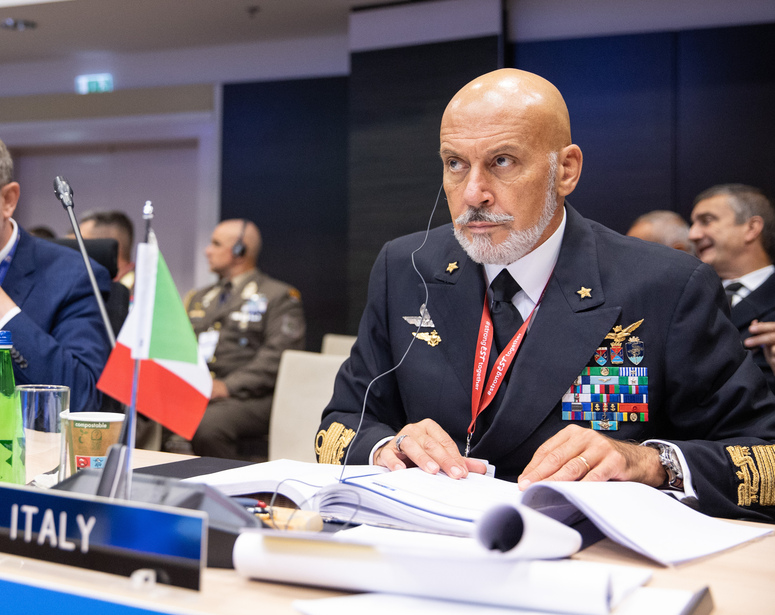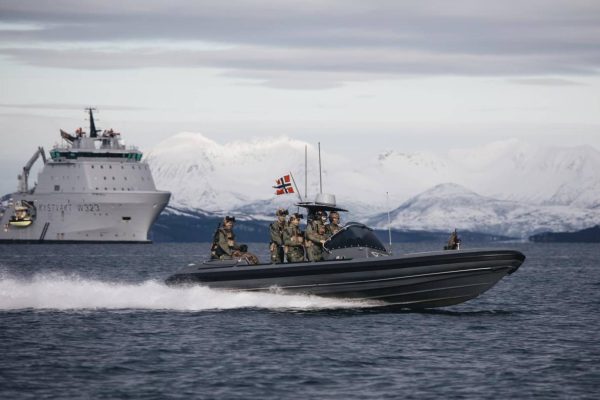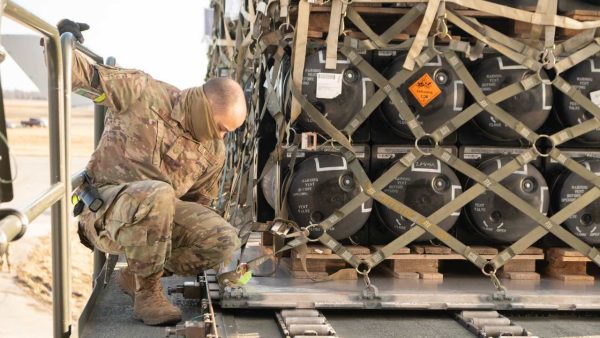Cavo Dragone has the credentials and experience to succeed. He is a career officer with a high operational profile, having served as Italy’s Chief of Defense Staff since October 2021 — a position expected to conclude in November 2024 — and as Chief of Staff of the Italian Navy. Since 2016, he has also led Joint Operations Command, the nation’s key command-and-control body, which directs missions and military operations around the world.
As Chair of the NATO Military Committee, which brings together all allied defense chiefs, he will oversee the activities of the alliance military structures, from the coordination of operations by allied forces to doctrine development and implementation. He will replace the Dutch admiral, Rob Bauer.
The swift and consistent implementation of objectives outlined in the 2022 Strategic Concept, along with new allied regional defense plans approved during the Vilnius Summit in July, will top Cavo Dragone’s in-tray. These responsibilities will not be easy.
Coordinating 31 — hopefully soon to be 32 — allies is a challenge on its own. National preferences and interests remain significant obstacles to standardization and coordinated defense procurement across the alliance, but also to improve interoperability of equipment and doctrine. The aim of raising defense spending to meet the 2% of GDP minimum target — a pledge made at the 2014 Summit in Wales — will also have to reckon with short-to-medium-term budget constraints for several allies, including Italy.
At the same time, Cavo Dragone will have the difficult task of elevating the strategic importance of the alliance’s southern flank at a time when the focus is inevitably on the eastern flank and Russia’s war in Ukraine.
Italy and other Mediterranean allies, including Spain, France, Greece, and Turkey, have repeatedly warned about the complex tangle of security threats emanating from the alliance’s southern neighborhood. These include terrorism, political and socio-economic instability, vulnerable energy supplies, and the effects of climate change.
Recent months have seen a troubling combination of military coups, new civil wars, and unprecedented natural disasters that have further exacerbated the insecurity of the North African and Sahel regions, bringing new suffering to already exhausted populations. Increasing violence and lack of economic opportunities are driving more and more people to seek refuge and a future in Europe, challenging immigration policies and fueling rifts at the heart of the European Union. There is little sign that any of these issues will improve over the coming years.
Such political divides and sudden national emergencies can impact the alliance’s ability to respond promptly and cohesively to potential military threats.
To make things worse, Russia and China are expanding their security and economic penetration in Africa and the Middle East while fomenting anti-Western and anti-NATO positions through disinformation campaigns and propaganda.
While China provides a longer-term challenge, by relying on economic agreements, huge infrastructure projects, and foreign direct investment in exchange for mining rights and access to strategic ports across Africa, Russia has created immediate strategic dilemmas for the alliance. It has capitalized on pre-existing instability and antipathy to the West, inking security cooperation agreements with local government elites, consolidating its military presence, and leveraging the role of Russian private military companies in Libya, Mali, Sudan, and the Central African Republic.
Available evidence indicates that in all these countries Russian mercenaries have taken part in military operations and committed atrocities against civilians. The Kremlin has also sought to consolidate its role as top weapons exporter to the continent, accounting for 40% of African imports of large weapon systems between 2018 and 2022.
Russia also maintains a capable naval squadron in the Mediterranean, including improved Kilo-class submarines equipped with long-range Kalibr Cruise missiles, and conducts regular exercises with countries such as Algeria and Egypt.
While the botched invasion of Ukraine and the rift between the Kremlin and the Wagner PMC is likely to affect Russia’s power projection in Africa and the MENA region, Moscow’s activities in these areas will continue to pose a serious threat to the alliance. Unsurprisingly, according to European military sources familiar with this issue, Russian state agencies including the GRU and other military bodies are already taking over shares of Wagner’s wide portfolio of activities in countries like Mali and Sudan.
These external threats intertwine with NATO’s internal challenges, chiefly around interoperability, digitalization, and preparation of the alliance for highly demanding multidomain operations against peer and near-peer adversaries.
The challenge posed by China will also require deeper security and military cooperation with partners across the globe, especially in the Indo-Pacific.
As the US and European countries deepen their security and defense ties with Japan, India, and other countries in that region, Cavo Dragone may advocate for NATO’s closer engagement with regional partners, for example through more joint exercises and training as well as military staff exchange programs.
The Italian admiral’s appointment represents a major achievement for Rome and a recognition of the role his homeland plays in NATO. Italy is already one of the biggest military contributors to the alliance in terms of resources and personnel, participating in nine missions involving around 5,200 soldiers.
Cavo Dragone could take this opportunity to further advance Italy’s role and position in NATO and promote its influence in the organization’s decision-making process as it braces for looming geopolitical and military challenges.
Federico Borsari is a Leonardo Fellow with the Transatlantic Defense and Security Program at the Center for European Policy Analysis (CEPA). He is also a NATO 2030 Global Fellow and a Visiting Fellow at the European Council on Foreign Relations (ECFR). His main research interests include security and defense dynamics, transatlantic security relations, and the impact of new technologies on warfare.
Europe’s Edge is CEPA’s online journal covering critical topics on the foreign policy docket across Europe and North America. All opinions are those of the author and do not necessarily represent the position or views of the institutions they represent or the Center for European Policy Analysis.





